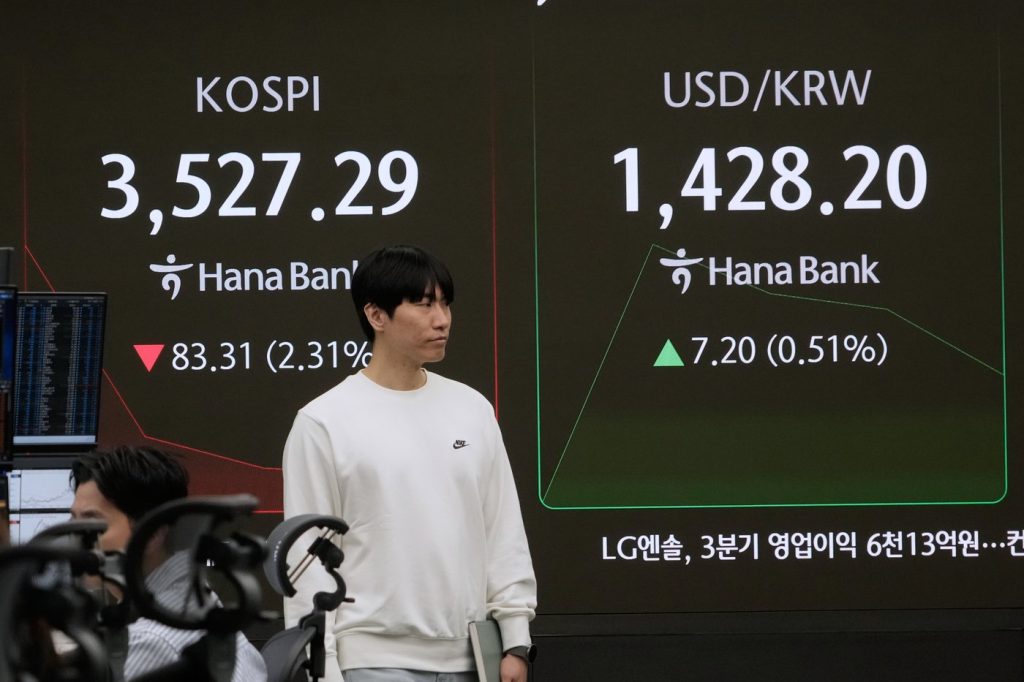Top Stories
Asian Markets Plunge as Wall Street Faces Trade Turmoil

Asian shares experienced a significant decline on Monday, following a dismal performance on Wall Street that marked its worst day since April. Concerns over escalating trade tensions with China have contributed to market volatility, as U.S. stocks plummeted after President Donald Trump threatened to raise tariffs on Chinese goods.
The U.S. markets faced turmoil on Friday, with the S&P 500 dropping 2.7% to close at 6,552.51. The Dow Jones Industrial Average fell 1.9%, settling at 45,479.60, while the Nasdaq Composite lost 3.6%, ending at 22,204.43. This downturn was exacerbated by Trump’s response to China’s restrictions on exports of rare earth materials, crucial for various industries, including electronics and aerospace.
Regional Market Reactions
In Hong Kong, the Hang Seng Index fell 3.5% to 25,374.00, while the Shanghai Composite in mainland China declined by 1.3% to 3,846.25. The South Korean Kospi dropped 1.7% to 3,550.32, and Australia’s S&P/ASX 200 decreased by 0.9% to 8,882.60. Markets in India and Taiwan also reported losses, with the Sensex down 0.5% and the Taiex shedding 1.7%. Trading in Tokyo was halted due to a public holiday.
Despite the turmoil in Asia, U.S. futures showed some resilience. The contract for the S&P 500 was up 1.2%, while the Dow’s futures gained 0.8% in early trading.
Trade Relations and Economic Outlook
China reported an 8.3% increase in global exports for September, marking the strongest growth in six months. However, exports to the U.S. fell sharply by 27% year-on-year, highlighting the shifting dynamics in trade relations as Chinese manufacturers seek alternative markets.
President Trump’s comments on social media indicated rising frustrations with foreign trading partners, stating that “other countries are extremely angry at this great trade hostility.” He also signaled a possible withdrawal from previously planned discussions with Chinese leader Xi Jinping.
The U.S. stock market’s recent decline has raised concerns about inflated asset prices, particularly within the technology sector. The S&P 500’s remarkable 35% increase from April lows has led critics to suggest the market is overvalued, especially as corporate profits have not kept pace with rising stock prices.
In commodity markets, oil prices reacted sharply to the geopolitical climate. The price for a barrel of benchmark U.S. crude fell 4.2% to $58.90 amid a ceasefire between Israel and Hamas in Gaza, which could stabilize oil supply concerns. Brent crude, the international standard, dropped 3.8% to $62.73 per barrel, although it traded higher early Monday at $63.65.
As the situation develops, market participants remain cautious. Investors are closely monitoring the implications of any further actions from the U.S. government regarding tariffs and trade policies. The yield on the 10-year Treasury note decreased to 4.05% from 4.14%, reflecting a cautious sentiment among investors, compounded by consumer sentiment data from the University of Michigan indicating persistent economic concerns.
Overall, the combination of escalating trade tensions and a fluctuating economic landscape is likely to keep financial markets on edge in the coming weeks.
-

 Science3 months ago
Science3 months agoToyoake City Proposes Daily Two-Hour Smartphone Use Limit
-

 Health4 months ago
Health4 months agoB.C. Review Reveals Urgent Need for Rare-Disease Drug Reforms
-

 Top Stories4 months ago
Top Stories4 months agoPedestrian Fatally Injured in Esquimalt Collision on August 14
-

 Technology3 months ago
Technology3 months agoDark Adventure Game “Bye Sweet Carole” Set for October Release
-

 World3 months ago
World3 months agoJimmy Lai’s Defense Challenges Charges Under National Security Law
-

 Lifestyle4 months ago
Lifestyle4 months agoVictoria’s Pop-Up Shop Shines Light on B.C.’s Wolf Cull
-

 Technology3 months ago
Technology3 months agoKonami Revives Iconic Metal Gear Solid Delta Ahead of Release
-

 Technology3 months ago
Technology3 months agoApple Expands Self-Service Repair Program to Canada
-

 Technology3 months ago
Technology3 months agoSnapmaker U1 Color 3D Printer Redefines Speed and Sustainability
-

 Technology3 months ago
Technology3 months agoAION Folding Knife: Redefining EDC Design with Premium Materials
-

 Technology4 months ago
Technology4 months agoSolve Today’s Wordle Challenge: Hints and Answer for August 19
-

 Business4 months ago
Business4 months agoGordon Murray Automotive Unveils S1 LM and Le Mans GTR at Monterey









